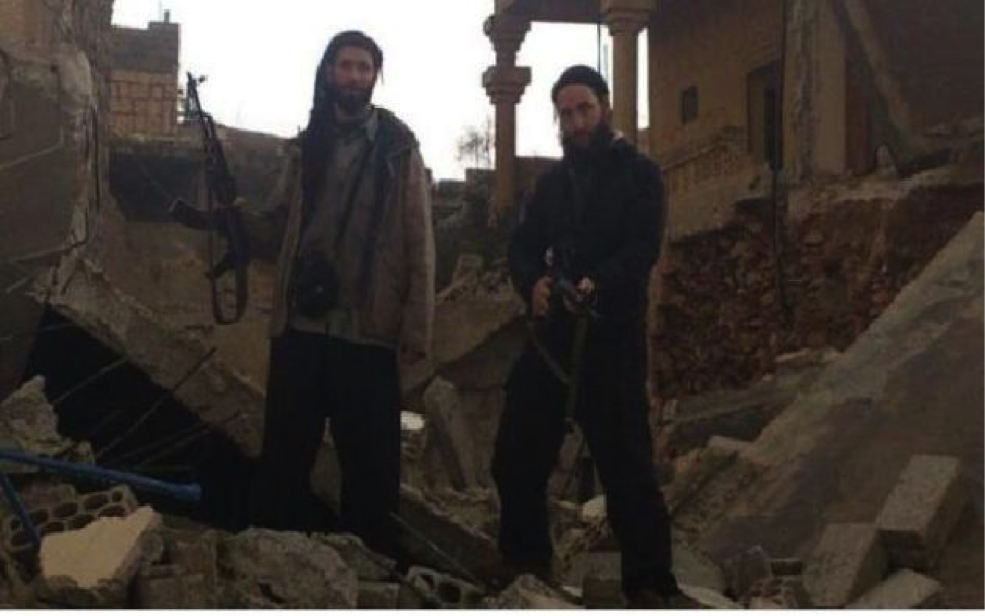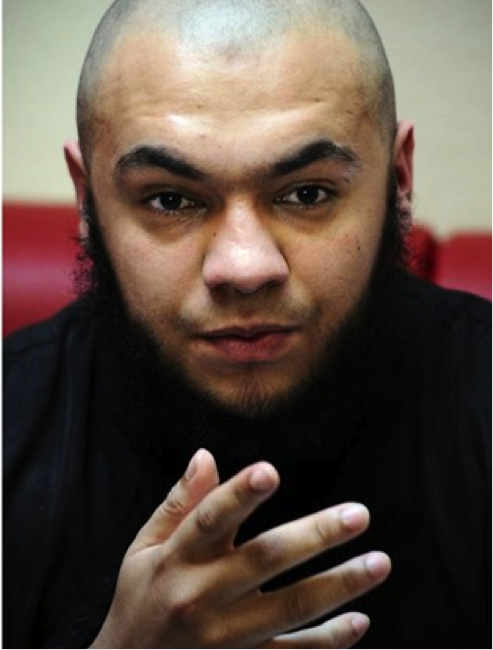NOTE: As with all guest posts, the opinions expressed below are those of the guest author and they do not necessarily represent the views of this blogs administrator and does not at all represent his employer at the Washington Institute for Near East Policy.
Jihadology.net aims to not only provide primary sources for researchers and occasional analysis of them, but also to allow other young and upcoming students as well as established academics or policy wonks to contribute original analysis on issues related to jihadism. If you would like to contribute a piece, please email your idea/post to azelin [at] jihadology [dot] net.
Past Guest Posts:
North Caucasus Caucus, “Turkish Fighters in Syria, Online and Off,” August 20, 2013.
Mark Youngman, “Book Review of David Malet’s “Foreign Fighters: Transnational Identity in Civil Conflicts”,” June 20, 2013.
Hazim Fouad, “Salafi-Jihadists and non-jihadist Salafists in Egypt – A case study about politics and methodology (manhaj),” April 30, 2013.
Daveed Gartenstein-Ross and Tara Vassefi, “Perceptions of the “Arab Spring” Within the Salafi-Jihadi Movement,” November 19, 2012.
Jack Roche, “The Indonesian Jamā’ah Islāmiyyah’s Constitution (PUPJI),” November 14, 2012.
Kévin Jackson, “The Pledge of Allegiance and its Implications,” July 27, 2012.
Behnam Said, “A Brief Look at the History and Power of Anasheed in Jihadist Culture,” May 31, 2012.
Jonah Ondieki and Jake Zenn, “Gaidi Mtaani,” April 24, 2012.
Joshua Foust, “Jihadi Ideology Is Not As Important As We Think,” January 25, 2011.
Charles Cameron, “Hitting the Blind-Spot- A Review of Jean-Pierre Filiu’s “Apocalypse in Islam,” January 24, 2011.
Daveed Gartenstein-Ross, “Why Jihadi Ideology Matters,” January 21, 2011.
Joshua Foust, “Some Inchoate Thoughts on Ideology,” January 19, 2011.
Marissa Allison, “Militants Seize Mecca: Juhaymān al ‘Utaybī and the Siege of the Grand Mosque in Mecca,” June 9, 2010.
—
Belgian Jihadis in Syria
By Pieter Van Ostaeyen
Belgium always had a bit of a dual relationship with its numerous immigrants from the Maghreb and Turkey. In the 1960’s Belgium heavily encouraged migration from Morocco and Turkey. They were seen as cheaper work forces for the steel and coal industry, which made Belgium a crucial part of the precursor to the European Union and the integration of European economies.
When the heavy industry faded though, these immigrant families remained in Belgium. Currently, some of the third and fourth generation of these immigrants are people who live on the margins of society. The Belgium government over the last several decades never really succeeded integrating the Islamic communities. In the late 1980’s and 1990’s Moroccon youth were renowned for crimes like drug-dealing, theft, and many of them were jobless yet drove around in big cars like Mercedes and BMW.
In one manifestations of the inability to integrate (or the lack of will to do so by some) during the last few decades, led to the creation of the Salafist movement Sharia4Belgium on March 3 2010. Their spokesman Fouad Belkacem (aka Abu Imran) was soon branded persona non grata on public fora. Under heavy public pressure and after several judicial actions against the group, Sharia4Belgium dissolved itself on October 7 2012.

Photo 1: Fouad Belkacem, spokesman of Sharia4Belgium
Meanwhile the war in Syria had been raging for about a year and a half. Reports started appearing claiming European Muslims were fighting in Syria. It would only take a couple of months before the first Belgian and Dutch jihadis were identified. On February 16, 2013 another horrible video from Syria (first published by @hlk01) was posted. There was Dutch heard in the video. Later that week, the Dutch newspaper De Telegraaf, published an article claiming that Dutch security forces (AIVD) were already investigating the matter.
On March 7, Eurojust first confirmed that there were Belgians amongst the European jihadis in Syria. On March 15 and 16, 2013 Harald Doornbos and myself found three YouTube videos (originally posted by Halab News Network and since deleted by Google) in which I clearly heard some Flemish guys. Belgian media later picked up on this story. Later, the parents of Brian De Mulder and Jejoen Bontinck recognized their sons in the videos. The Belgian far right extremist party Vlaams Belang succeeded in luring in one of the families for their own propaganda and the father of Bontinck even went to Syria in search for his son. They all blamed Sharia4Belgium.
Since then reports about the Belgian jihadis appeared weekly. On April 10, 2013 the Belgian weekly magazine Knack published an article on the Belgian jihadis in Syria, claiming that already 12 of them were killed (these reports as of today remain unconfirmed). Here is an overview of those who died fighting in Syria or those who got arrested trying to get there.
On the 22nd of June, Belgian newspapers De Standaard and De Morgen gave an extensive overview of the developments concerning Belgian jihadis in Syria. This is all because of the announcement of the death of ‘Abd ar-Rahmān Ayāshī, a French-Syrian who had left Belgium back in 2012 after he was sentenced to 8 years in jail. ‘Abd ar-Rahmān Ayāshī became a battalion-leader of Suqūr as-Shām, leading about 600 in battle.

Photo 2: ‘Abd ar-Rahmān Ayāshī
Ayāshī was the son of the Sheikh Bassām Ayāshī, a Syrian living in Molenbeek, Brussels. In the past the Ayāshī family was suspect to several investigations by the Belgian authorities (since September 2009).
A few months ago, the friend of Ayāshī, the French Raphael Gendron (at the right on this pic) was killed in Syria. Perhaps he was one of the first “Belgian” jihadis that got killed in Syria.

Photo 3: ‘Abd ar-Rahmān Ayāshī and Raphael Gendron in Syria
In this video Sheikh Ayāshī reacts to the death of his “two” sons in Syria.
Here is a very recent interview with the killed battalion leader published on YouTube on June 23:
[youtube https://www.youtube.com/watch?v=-lu9WFBEsrg&sns;feature=youtu.be]
There is no doubt that the deaths of Gendron and Ayāshī are the biggest losses among Belgian fighters in Syria.
Others proven killed are:
- Sean Pidgeon (Brussels)
- Tāriq Taqlitūn (Vilvoorde). He was killed in his apartment in Syria. His Belgian wife says he was allowed to pray one last time and then got executed.
- According to Hans Bonte, mayor of Vilvoorde, at least two other (unidentified) youngsters from his city got killed recently
- Another death in the ranks of Sharia4Belgium in Syria is Nur ad-Din Abouallal aka Abu Mujahid, allegedly killed in Syria around the 25th of July. His death was reported by his Belgian wife.

Photo 4: Nur ad-Din Abouallal aka Abu Mujahid, Sharia4Belgium’s second man
- August 21: Isma’il Amgroud, 22, Maaseik, Belgium. He left Maaseik early April and died in Syria in late June. He was the youngest of three who left Maaseik to fight in Syria. All of them were officially deleted from civil registrations.
- August 22: Three inhabitants of Genk are arrested at the Greek-Turkish border. One of the arrested was a 26 year old Italian, who converted to Islam. One of the other men arrested was most likely his father. They returned to Genk and are under supervision of the authorities.
- August 28: Hans Bonte, Mayor of Vilvoorde, in an interview in Belgian newspapers, claims that at least 25 youngsters from his city left or will leave for Syria.
Others still fighting in Syria:
- About 33 members of the group Sharia4Belgium. Best known: Jejoen Bontinck, Brian De Mulder (both from Antwerp), and Hussayn Elouassaki aka Abu Fallujah (supposed leader of the Ansār Brigade of Majlis Shūra al-Mujahidīn near Aleppo – accused of a gruesome beheading)
- About 150 to 200 Belgian fighters
As most research during the last half year pointed out it is believed that some Belgians joined Jabhat an-Nusra although most of them first aligned with Majlis as-Shura al-Mujahidin (currently a sub-group of ISIS) or Katībat al-Muhājirīn (led by the Chechen Jihadi Abū ‘Umar as-Shīshāni and recently merged with two other groups into Jaysh al-Muhājirīn wa-l-Ansār). Most Belgian jihadis appear to be fighting in or near Aleppo and Idlib. According to recent Belgian reports most of them were based in the village of Daret Izza in the Northern Aleppo province.
It is highly likely that as the Syrian conflict continues to go on there will be more fighters that will join up with the rebels. The Belgian government is worried for their return due to the possibility these newly trained fighters could then plot attacks on the homeland.
Pieter Van Ostaeyen
Master Medieval History 1999
Master Arabic & Islamic Studies 2003

1 Reply to “GUEST POST: Belgian Jihadis in Syria”
Comments are closed.